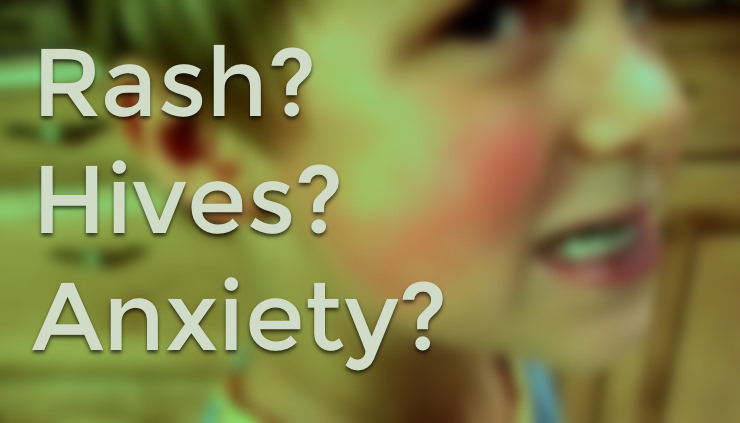If you’re a regular reader of this blog, by now you’ve gathered that anxiety is more than just a psychological issue and can manifest itself in a myriad of different ways. One unusual physical symptom sometimes attached to anxiety is the way fear can cause you to itch or break out with a rash or hives.
Anxiety can cause or make skin problems worse
 The itchiness can be related to skin problems that anxiety makes worse, or caused by anxiety directly. People can even experience stress urticaria, or stress hives, that develop due to chronic stress, anxiety or tension, and appear as red, raised and swollen areas on the skin that appear suddenly. These stress hives can cause itching, and some people report having a burning or stinging sensation whenever they appear. Stress hives can appear on any part of the body – face, hands, feet, arms, etc., – and can vary in size from as small as a pencil eraser to as large as a dinner plate. Stress hives have been known to spread from place to place on the body, and smaller areas of hives can blend together to form larger areas. Urticaria can be acute, meaning that hives last less than six weeks, and also chronic, which is when hives last longer than six weeks.
The itchiness can be related to skin problems that anxiety makes worse, or caused by anxiety directly. People can even experience stress urticaria, or stress hives, that develop due to chronic stress, anxiety or tension, and appear as red, raised and swollen areas on the skin that appear suddenly. These stress hives can cause itching, and some people report having a burning or stinging sensation whenever they appear. Stress hives can appear on any part of the body – face, hands, feet, arms, etc., – and can vary in size from as small as a pencil eraser to as large as a dinner plate. Stress hives have been known to spread from place to place on the body, and smaller areas of hives can blend together to form larger areas. Urticaria can be acute, meaning that hives last less than six weeks, and also chronic, which is when hives last longer than six weeks.
Stress and your immune system
Itchy skin or hives caused by anxiety aren’t exactly “common” in the general sense, but anxiety causes a significant amount of stress, and stress can have a detrimental effect on organs and on the body’s immune system. Since the skin is the largest organ on the body, anxiety can lead to a rash, hives, and an overall itchy feeling. Furthermore, when the immune system starts to falter from stress, it starts sending histamine into the body to fight off what is ailing it – all the anxiety. So, in the simplest terms, the body forms an allergic reaction to stress. The stress can’t be eliminated with histamine, so the histamine causes hives to appear on the body.
Connection between stress and urticaria
Dermatologists are learning that there is a definite link between the mind, the immune system and the skin. More research is focusing on the relationship between stressful life events and the onset of urticaria. Dermatologists are seeing that it’s not uncommon to see urticaria occur after a major life stressor, or that the patients who are most impaired by urticaria have more limited stress management skills. They can see a connection in patients with relatively minor dermatological symptoms and a seemingly disproportionate amount of distress about these symptoms, which might suggest the patients don’t have the capacity to recognize the psychological component to their distress and/or suffering.
Examples of stress related skin problems
It’s very difficult to determine the exact cause of itchiness from anxiety without a full examination, because it could be caused by a variety of different factors. But, the most common causes include:
- Stress hives. As previously mentioned, hives are itchy bumps on the body that can be triggered by stress. Anxiety causes a considerable amount of stress on the immune system, so those prone to hives are likely to get them.
- Sweat rash. Anxiety also causes sweating, and sweating can lead to a sweat rash, otherwise known as a heat rash. This type of rash is non-threatening, but can be extremely itchy and may take as long as two weeks or more to disappear.
- Specific triggered itch. Although less common, anxiety also triggers skin conditions that a person already has. Anxiety is known to trigger eczema, herpes, psoriasis, and other skin disorders. None of these is life threatening or dangerous if triggered.
- Worse or heightened sense of itch. Itching and rashes are fairly common experiences in life, even when nothing is the matter. However, if one suffers from anxiety, physical sensations can often feel worse than they would if he/she didn’t suffer from anxiety. Thus, it’s possible that a very light rash that could otherwise be ignored feels much worse, and causes the person to focus on it more.
- Unexplained. It’s also possible to experience an itch for reasons that simply can’t be explained.
What to do about it
At any time, if your stress hives are coupled with swelling of any part of the throat or face and it causes restricted breathing, you should seek treatment immediately from your closest emergency room.
Some cases of hives will go away on their own without any course of treatment. If something is definitively causing a person to experience hives, the doctor will recommend avoiding that trigger. 
If hives are very itchy, the doctor may recommend taking an antihistamine (medicine) to block the release of histamine to the bloodstream. It may take some time for your doctor to help you find the right treatment. Most of the time, once the anxiety trigger(s) are addressed, hives will go away on their own. Even chronic hives can sometimes clear up on their own within a few months to a year. Stress hives have shown significant improvement with histamine when treated with relaxation techniques and other anxiety management tools.
 Get Help With Anxiety
Get Help With Anxiety
Take our Anxiety Quiz to see what level of anxiety your child is experiencing. The results give you advice on what next steps you should try.
Our Turnaround Program is available as Digital Download or Classic CD.
Resources:
“Hives.” Teens Health. Retrieved on April 1, 2016 from www.kidshealth.org.
“Learn what to do when anxiety makes you feel itchy.” Calm Clinic. Retrieved on April 1, 2016 from www.calmclinic.com.
Schwanke, J. (2012). “Clinicians examine mind-body connection of urticarial, stress.” Dermatology Times. Retrieved on April 18, 2016 from www.dermatologytimes.com.
“Stress Hives: Causes, symptoms and cures of stress hives.” Hives. Retrieved on April 1, 2016 from www.hives.org.
Featured Image Photo credit: janielianne via Foter.com / CC BY-NC-ND

 Emily Powell Bass
Emily Powell Bass
Martina McKeough says
Anxiety most certainly can create all kinds of physical symtoms including itching. I work as a hypnotherapist and I see issues such as this every day at work. This week one of my clients who has a fear of patterns of holes reported feeling itchy all over when looking at a picuture of his stressor even for a few seconds. Anxiety hypnosis can be a great way of getting control of the anxiety so that the physical response to the stressors start to disappear away.
Sam Wilkins says
I didn’t know it is possible to get hives from stress. My sister has an anxiety disorder and I’ve noticed she gets hives on her neck when she’s under even a little bit of pressure. After reading through this, I think it would be best if I suggested she sees a doctor about the issue.
John says
Yes, stress can definitely cause physical symptoms. Consciousness becomes matter, and so emotional disorders eventually manifest physically. John, http://www.ibeatmysocialanxiety.com
Sherry says
Does any one have any pictures of these hives i have been having reactions lately and would like to see if this could be the reason if you do have pictures please share thank you
becky says
I never knew that anxiety could cause these outbreaks until I spoke to my doctor last week. He determined that anxiety may be a reason for my chronic hives.